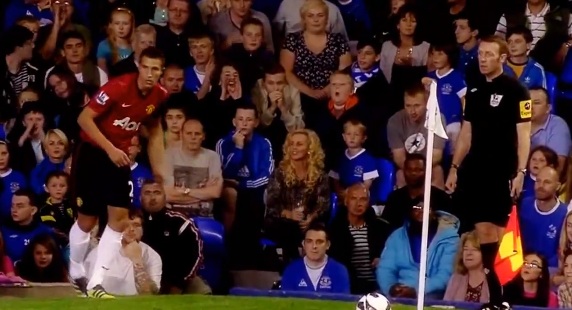After City pipped United to the Premier League title in the final minute of the final match on the final day of last season, fans and pundits have been questioning whether or not the Red Devils can snatch the trophy right back at the end of the 2012-2013 campaign. With all due respect to the likes of Chelsea, Arsenal, Tottenham and Liverpool — and with all due respect to the excellent work that these teams have done in the transfer window this past summer, it is a very brave man who would bet against the title leaving Manchester.
[showmyads]Indeed, there has been a distinctive buzz in Manchester over the past couple of weeks — something akin to electricity in the air. In the blue corner we have a team with seemingly endless riches, bent on domestic and European glory by any means necessary. In the red corner we have a club steeped in football history and possessing the quality to be the best team in the world, despite currently being limited by financial restrictions. So as the new season rolled around there was, quite understandably, a sense of burgeoning anticipation in the football world and great expectations amongst the respective supporters.
Optimism is an excellent trait for football fans to possess, but it is essential that the supporters properly manage their expectations so that they actually enjoy the football on show. Expectation is a double edged sword. “Some people suffer from a lack of healthy expectations and thus limit their potential and others set unattainably high expectations for themselves and thus assure their frustration and unhappiness (Schwartz, 2009).”
After City’s nail-biting win over newly promoted Southampton at the Etihad, and United’s 1-0 defeat away at Goodison, much of the preseason joy was sucked out of both sets of Manchester fans and this is likely due to the setting of unrealistic expectations. With a fully fit squad and the added security of playing at home, most City fans did not merely expect a win, they expected a massacre – a clear and unambiguous statement to their rivals that winning the title last season was no mere fluke. United fans, on the other hand, were already wounded by the fact that they had lost out to City last time around. Most pundits agree that the defining moment which swung last season’s title race in City’s favor was the thrilling 4-4 draw with Everton at Old Trafford. Now with United’s ranks bolstered by the signings of Robin Van Persie and Shinji Kagawa, the fixture list presented the Red Devils with the perfect opportunity to send a big message to their local rivals and get a measure of revenge for the damage Everton inflicted upon their title aspirations in the previous campaign. A chance to kill two birds with one stone…but it was not to be. As the old saying goes, the game is not played on paper and both sets of supporters will do well to remember that.
It is such a strange experience for fans to watch their team turn in a good performance (and in City’s case, pick up three points) and yet still feel absolutely deflated after 90 minutes. In fact, it totally sucks. For those crushed United and City fans out there, the bottom line is this: for your passion and your love of the beautiful game to remain intact throughout the season, you need to balance your expectations and optimism with reality. The reality is that City picked up three points. The reality is that United played well, gave debuts to two new signings, had no major injuries and now have one of the toughest away fixtures in the league behind them. Healthy expectations are vital to happiness and the sooner all football fans come to realize this, the better equipped they will be to deal with the many unexpected surprises of the new Premier League season.
References
Schwartz, M. (January 1, 2009). The paradox of expectations. Psychology Today. Retrieved August 25, 2012 from http://www.psychologytoday.com/blog/shift-mind/200901/the-paradox-expectations
———————————————————————————————————–
Disclaimer: This document may contain copyrighted material (pictures) whose use has not been specifically authorized by the copyright owner. WIP is making this article available in our efforts to advance the understanding of psychological principles in sport in an educational setting online. We believe that this constitutes a ‘fair use’ of the copyrighted material as provided for in section 107 of the U.S. Copyright Law. If you wish to use this copyrighted material for purposes of your own that go beyond ‘fair use,’ you must obtain permission from the copyright owner.


